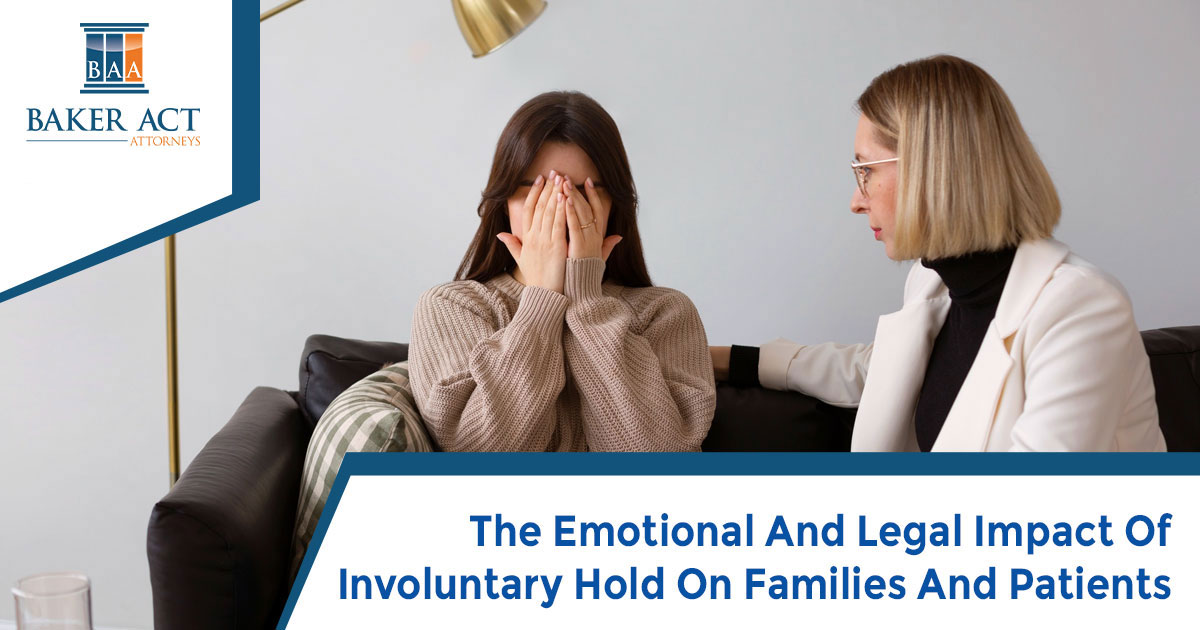An involuntary hold is generally considered an effort of last resort and used when someone is deemed an immediate risk to themselves or others. When an involuntary hold is imposed on yourself or a loved one, it can have severe emotional and legal impacts.
Understanding the basics of an involuntary hold and its emotional and legal impacts can help you navigate the complexities of the mental health legal landscape. With sensitive and professional legal guidance on different types of Baker Acts, you can ensure that rights are protected and emotional repercussions are minimized.
What Is An Involuntary Hold
An involuntary psychiatric hold is a legal process permitting the state to step in when an individual is experiencing a mental health crisis. It is an extreme measure used to assist a vulnerable individual during a psychiatric and behavioral emergency, and it needs to be executed with care for the patient and within the legal framework.
In Florida, involuntary holds are carried out via the Baker Act, which judges, law enforcement officials, and mental health professionals can initiate. The intervention can be a short-term measure, lasting at least 72 hours. During this time, professionals aim to stabilize the individual and assess whether long-term intervention is needed.

Emotional Impact Of An Involuntary Hold
While involuntary holds exist to protect individuals and their communities, the process can be an intensely emotional experience for both patients and their loved ones. Understanding the emotional impact of an involuntary hold is essential to managing psychological and relational repercussions.
Loss Of Autonomy
Individuals may feel trapped and powerless when put under an involuntary hold, having lost control while under observation. Sensations of fear and vulnerability may bubble to the surface, making a fragile situation even more volatile.
Losing autonomy can often lead to anger, sadness, and confusion. This is especially pertinent among individuals who value independence, who may experience a form of trauma when being held against their will. By acknowledging the emotional turmoil of the loss of autonomy, families can support their loved ones through compassion and understanding.
Isolation
Individuals are separated from their loved ones and familiar environments when placed under an involuntary hold. In isolation, feelings of loneliness and abandonment can manifest, triggering distress.
Being kept in a psychiatric facility can erode emotional connection and trust, leading to anxiety and despair. Understanding the resounding vulnerability of this sense of alienation is important when offering compassionate support.
Stigmatization
Stigmatization is a significant emotional impact of an involuntary hold, causing individuals to feel misunderstood and marginalized. Being placed under observation can lead to shame and concern about how others perceive their current state.
Stigma adds a layer of emotional pain, compounding other emotional repercussions such as isolation. Recognizing the stigma of mental health is an essential step to creating a safe space for individuals to share their experiences and ask for support.
Fear And Guilt
Families may find themselves grappling with feelings of fear and guilt when watching a loved one be placed in a vulnerable position and acting out against the involuntary hold.
Feelings of helplessness and fear for their loved one’s safety may manifest, as well as guilt, while wondering whether specific actions contributed to the need for an involuntary hold. The emotional turmoil can strain families and their relationships.

Legal Impact Of An Involuntary Hold
In Florida, the Baker Act provides the legal framework for addressing mental health crises through involuntary holds. It stipulates a range of legal implications that can affect individuals and their families, such as the following.
Rights Of The Patient
While an involuntary hold may remove a patient’s autonomy, the Baker Act stipulates strict processes to guarantee the patient’s rights.
The Baker Act stipulates that a patient has a right to:
- Dignity and to be treated in a humane way
- Due process and opportunity to contest the need for a hold
- Communicate with an attorney and access legal representation
- Information about their rights and reasons for the involuntary hold
- Participate in treatment planning and decision-making when possible
- Privacy concerning medical records
- To be free from restraints or seclusion unless justified and documented
Civil Liberties Versus Public Safety
An involuntary hold highlights the delicate line separating civil liberties, such as the right to personal autonomy and public safety. It removes an individual’s freedom of choice and raises questions about personal rights, but it is applied to protect the individual and the public.
Public safety is an essential consideration, and if an individual poses a risk to themselves or others due to a mental health crisis, then certain civil liberties take second priority. Even so, it is essential to carefully consider the legal nuances of an involuntary hold and the necessary steps to safeguard individual rights while addressing the urgent need for public safety. Importantly, legal approval is needed to order an involuntary hold.
Long-Term Implications
The long-term implications of an involuntary hold are significant, affecting both families and the patient. A record of an involuntary hold can impact future opportunities for employment, housing, and personal relationships due to stigma. These implications amplify if the hold is extended to involuntary commitment. Other long-term legal ramifications could impact rights, such as the right to possess a firearm, and family legal matters, such as custody arrangements.
With these long-term legal implications in mind, involuntary holds must be conducted fairly and according to legal requirements.
Offering Legal Support
As much as we would like to have confidence in mental health facilities, there are instances when patients are kept unfairly or have their rights infringed upon. In this instance, a Baker Act attorney can help challenge a wrongful hold and reinstate an individual’s rights.
To navigate the complexities of an involuntary hold, one needs a strong understanding of legal options and advocacy resources. At Baker Act Attorneys, our team is committed to helping families understand the legal framework surrounding involuntary holds and protecting individuals who may be unfairly held.
We offer legal expertise and knowledge that empowers families to navigate these challenging situations confidently. If you or a loved one is experiencing an involuntary hold that needs to be contested, we want to hear from you. Call 855-429-0074 to find out more.

